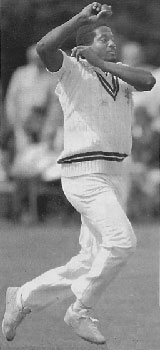
|

Sylvester Clarke: as clinically fearsome as any of his contemporary colleagues
© The Cricketer
|
|
Cricket has, regrettably, many incidents of players being pelted with objects by bored or malicious spectators, but examples of the players retaliating in kind are mercifully rare. Perhaps the most serious case came at Multan on New Year's Eve 1980 when Sylvester Clarke, the West Indian fast bowler, struck a spectator with a brick.
Of the West Indian battery of fast bowlers who dominated the 1980s, Clarke is one of the more anonymous. And yet, as Wisden noted, many who faced him rated him "as clinically fearsome as any of his contemporary colleagues." Those who played with and against him in South Africa, where he also represented Transvaal, Northern Transvaal and Orange Free State, "spoke of in similar awe of his ability to generate frightening pace and steep lift from a relatively short, ambling approach and an ungainly, front-on delivery."
Clarke's international career consisted of only 11 Tests, nine of which were on the subcontinent and only one at home, but he still took 42 wickets at 27.85. Initially, his opportunities were limited by the abundance of fast-bowling talent in the Caribbean at the time, and then by his total ban when he threw in his lot with the West Indies rebel side which toured South Africa when he was at his peak.
The brick-throwing incident came at the end of a tough two-month tour of Pakistan, and West Indies went into the fourth and final Test at Multan with a 1-0 lead courtesy of an innings victory at Faisalabad.
On the second day of the deciding Test, the crowd was restless. West Indies had been bowled out for 246, but in reply Pakistan were struggling, with Clarke starting the rot by dismissing both openers. Tension all round was high. The third Test at Karachi had seen some unfortunate incidents when West Indies fielders had fruit thrown at them, and on the first day at Multan it was reported that the West Indian changing room had been damaged after what The Gleaner described as "a series of questionable decisions".
Clarke was fielding on the fine-leg boundary when he was struck by an orange thrown from the crowd. That was the final straw, as other objects, including small stones, had been landing near him for some time. Clearly angry, he picked up a brick which was used to mark the boundary and lobbed it into the spectators where it struck 22-year-old Shafiq Ahmed, a student, on the head.
Shafiq was rushed to hospital, where he underwent surgery while the crowd, understandably inflamed, showered the retreating Clarke with objects. Play was delayed for 20 minutes while order was restored, and it was only an appeal by Alvin Kallicharran, who went down on bended knee at the scene of the incident and pleaded for calm, which enabled the game to continue.
"It's an unfortunate incident," Clive Lloyd, the West Indies captain, told reporters. "I don't know if it's the wrong type of people who are watching sport these days. Clarke might have lost an eye from a stone [throw]. He is sorry about it. We are all sorry about it. But regardless of the provocation, we have got to behave ourselves."
Clarke and Jackie Hendriks, the West Indies manager, later visited Shafiq in hospital where Clarke's apology was accepted by the injured party.
Jack Bailey, the ICC's secretary, who was the neutral observer at the match, reported what he described as "a most unfortunate happening" to the West Indies board, who subsequently suspended Clarke for three matches and dropped him.
The media reacted with universal criticism of Clarke's action, although some pointed out that the authorities needed to do more to safeguard the players' safety. In a column syndicated throughout the Caribbean, Baz Freckleton wrote that the ICC needed to introduce neutral umpires as well as a Code of Conduct for players. It was more than a decade before his sound advice was acted upon.
Clarke only played on more Test, at Sydney in 1981-82, and the following year he threw in his lot with the rebels and received a life ban, never playing in the Caribbean again. Instead, he plied his trade in domestic cricket in England and South Africa.
I will end with one personal memory of Clarke. In the mid 1980s he turned up at Merrow, a small club in Surrey, to play for a West Indian side in the annual cricket week. He was a delight, and after the game was the life and soul of the party. I left the clubhouse at 3am and Clarke was still going strong, playing cards and still imbibing.
The following day I dragged myself to Lord's to watch Middlesex play Surrey - I was fit for little else - and was amazed to see Clarke's name on the scorecard. A few minutes later the PA announced that there was one change to the card ... ST Clarke had dropped out. The BBC report at lunchtime commented that Clarke had withdrawn due to a muscle strain. Shortly before tea, he finally appeared on Surrey's balcony, eyes hidden behind sunglasses and clearly nursing the mother of all hangovers. A call to a colleague at Merrow confirmed my fears - Clarke had spent what was left of the night sleeping on a bench in the dressing-room and had only been woken when the players arrived for the next day's match.
Is there an incident from the past you would like to know more about? E-mail us with your comments and suggestions. Bibliography
The Cricketer Various
Wisden Cricket Monthly Various
Martin Williamson is managing editor of Cricinfo
